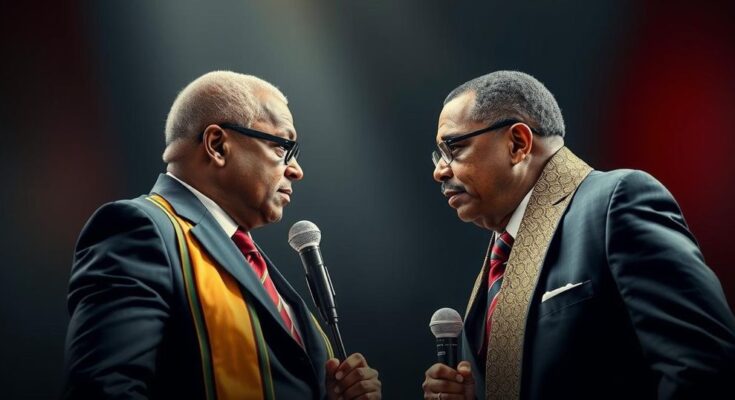Namibia is voting in a highly competitive election where Netumbo Nandi-Ndaitwah of Swapo aims to be the first female president, succeeding Hage Geingob. The election, crucial due to economic challenges and political dynamics, also sees main challenger Panduleni Itula of IPC. The youth’s participation may be decisive in this election as Namibians select their next leaders and new parliament members.
Namibia is currently conducting what is projected to be its most fiercely contested election since gaining independence 34 years ago from South Africa’s rule. Netumbo Nandi-Ndaitwah is representing the ruling South West Africa People’s Organisation (Swapo), aiming to become the country’s first female president after the death of Hage Geingob earlier this year. Economic challenges including rampant unemployment, poverty, and allegations of corruption have significantly diminished Swapo’s once unwavering support. Nandi-Ndaitwah is facing strong opposition from Panduleni Itula of the Independent Patriots for Change (IPC), along with 14 other candidates in the fray. As ballots were cast, long queues formed at polling stations nationwide, emphasizing the public’s readiness to participate in the democratic process.
Voting commenced at 07:00 local time and is scheduled to conclude at 21:00. Since its inception, Swapo has maintained power and now requires the winning candidate to secure over 50% of the vote for an outright victory, or else a second round will ensue between the two leading candidates. Nandi-Ndaitwah has urged citizens to exercise their right to vote, articulating the need for their voices to influence governance for the coming five years. She confronts a predominantly male political landscape but has established herself as a reputable figure with extensive government experience spanning 25 years.
In contrast, Itula, a former dentist and legal practitioner, had previously garnered 29% of the votes in the 2019 elections against Geingob’s 56%. He proclaimed that the election day represents a critical milestone for Namibia’s democracy as he cast his ballot. Currently, the nation is under the interim leadership of Nangolo Mbumba, who assumed the presidency following Geingob’s passing but is not contesting for the position. Analysts note that the election’s results may largely hinge on the younger demographic, who represent over half of the electorate. Besides electing a president, citizens will also be selecting new members of parliament in this extensive and peaceful nation, boasting a population of approximately three million, half of whom are eligible voters.
The Namibian elections are a significant event in the country’s political landscape, marking a potential shift in leadership after the long-standing tenure of the Swapo party since independence in 1990. The election is especially critical as the country seeks a new direction following the death of President Hage Geingob, creating an opportunity for political competitors, particularly those appealing to the youth voting demographic. The elections also reflect broader issues such as economic instability and public dissatisfaction with existing governance structures, which have made the political climate ripe for change. The participation of young voters, who constitute a substantial portion of the electorate, may play a pivotal role in shaping the outcome of the elections and redefining Namibia’s future governance.
In conclusion, the ongoing elections in Namibia symbolize a crucial juncture for the nation, potentially heralding a transition in power and a shift in political dynamics. As Netumbo Nandi-Ndaitwah and Panduleni Itula vie for the presidency, the implications extend beyond individual candidates to encompass broader societal issues such as unemployment, poverty, and democratic maturity. The significant turnout at polling stations illustrates the electorate’s engagement and desire for change in governance, particularly among the youth. Ultimately, the election’s results will determine not only the future leadership but also the country’s trajectory in addressing pressing socio-economic challenges.
Original Source: www.bbc.com




